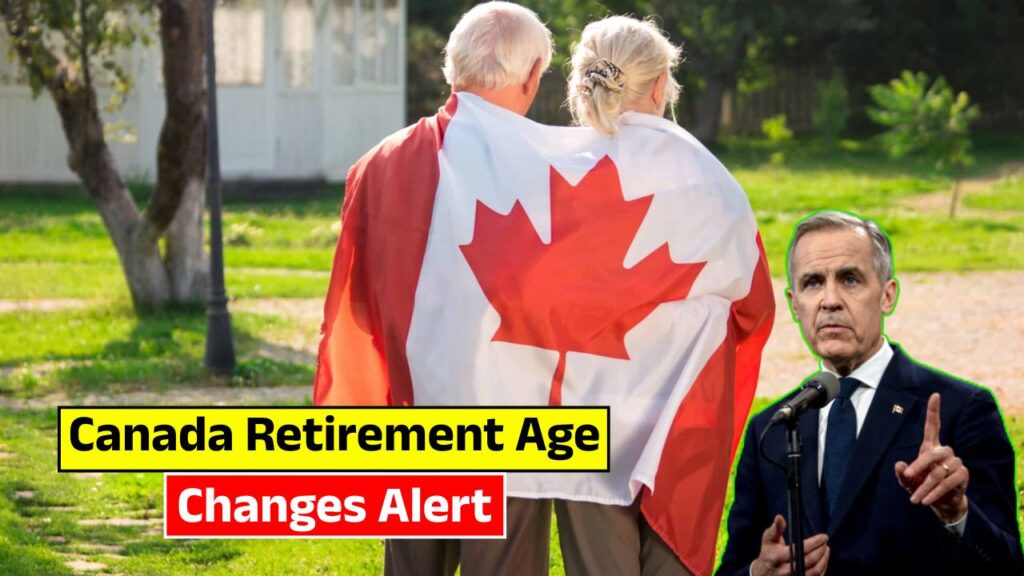Canadian Ends Retirement at 65 – Canada’s retirement landscape is undergoing one of its biggest transformations in decades, with major changes scheduled before 29 November 2025. The long-standing retirement age of 65 is no longer guaranteed, and officials have confirmed two significant age-related shifts that every Canadian worker must understand. These changes will directly influence when Canadians can begin receiving public pensions, how they plan long-term savings, and what adjustments older adults may need to make. As these updates roll out nationwide, Canadians are being urged to review their retirement strategies to avoid last-minute surprises and ensure financial stability.

New Retirement Age Reform Affecting Canadian Workers
The first major shift relates to a restructured retirement age framework that affects Canadian workers across different provinces. This reform changes how early retirement, standard retirement, and delayed retirement benefits are calculated under federal programs. Authorities have positioned this update as necessary due to life-expectancy growth and economic sustainability concerns. For workers approaching their mid-60s, the revised structure may alter the standard age they previously expected to retire. With the new system, the updated pension formula will determine how much workers receive from public pensions, making it essential for employees to reassess their long-term financial plans and adjust their goals before the new rules take effect.
Updated Pension Eligibility Rules for Canada Residents
The second major age shift focuses on eligibility adjustments for Canada residents who rely on pension programs like the Canada Pension Plan (CPP) and Old Age Security (OAS). The government is expected to tighten the criteria for full pension access, linking eligibility more closely to work history, contributions, and age thresholds. Many older adults may find that they need to work slightly longer to maintain the same level of income support they previously anticipated. These shifts aim to make the pension system more resilient as demographic patterns change. Canadians nearing retirement should stay informed so they can align their financial decisions with these upcoming policies.
| Retirement Factor | Current Rule | New Rule by Nov 2025 |
|---|---|---|
| Standard Retirement Age | 65 years | Variable age based on updated structure |
| CPP Early Access | 60–64 years | Possible age adjustments expected |
| OAS Eligibility | 65 years | Potential increase or revised criteria |
| Delayed Retirement Bonus | Up to age 70 | Bonus recalculated under new system |
| Contribution Requirements | Standard CPP contributions | Likely strengthened contribution linkage |
Retirement Planning Adjustments Needed for Older Canadians
As older Canadians prepare for these new age-related rules, retirement planning is becoming more complex and more important. Financial experts recommend reassessing savings habits, employer pension contributions, and long-term income projections before the November 2025 changes fully apply. Since the retirement age may become more flexible and eligibility criteria may tighten, pre-retirees must ensure their savings are sufficient to support delayed benefits or modified payment structures. These policy updates are intended to strengthen the country’s pension sustainability, but they also require older Canadians to be proactive, informed, and ready to adapt well before the transition period ends.
Retirement Benefit Adjustments Impacting Canadian Seniors
The new adjustments may influence how Canadian seniors access various government benefits and supplemental retirement income. Programs such as GIS, OAS, and CPP could apply revised calculations that shift benefit amounts depending on when seniors retire under the new system. By updating the age thresholds, the government intends to align retirement programs with Canada’s changing demographics and fiscal realities. Seniors should also watch for updates from provincial authorities, as some regions may introduce complementary support measures to ease the transition. Understanding these shifts early can help seniors avoid unexpected financial gaps when they stop working.
Frequently Asked Questions (FAQs)
 Canada’s $500 One-Time Housing Benefit Announced — Payment Timeline and Eligibility Details Released
Canada’s $500 One-Time Housing Benefit Announced — Payment Timeline and Eligibility Details Released
1. Why is Canada changing the retirement age?
The government is updating the structure to keep pension programs sustainable as life expectancy increases.
2. Will Canadians still be able to retire at 65?
Retiring at 65 may still be possible, but new rules could affect pension amounts and eligibility.
3. How will CPP benefits change under the new rules?
CPP calculations may shift based on new age bands and contribution requirements.
4. When do the new retirement changes become effective?
The reforms are expected to take effect before 29 November 2025 nationwide.



